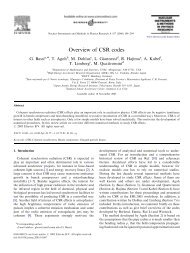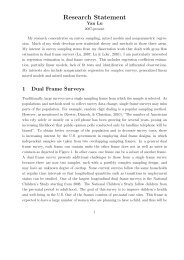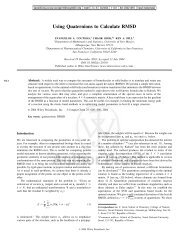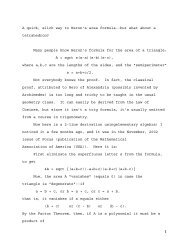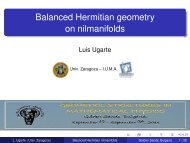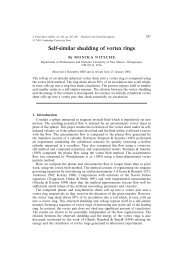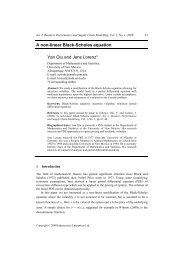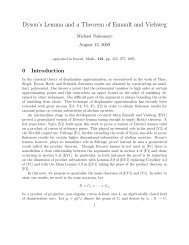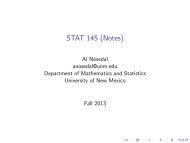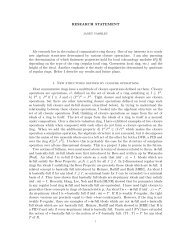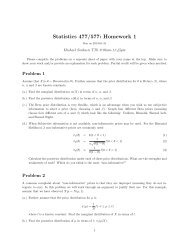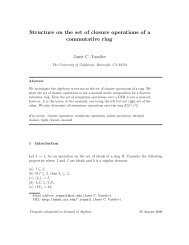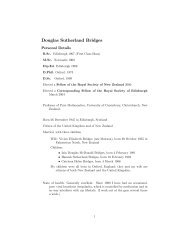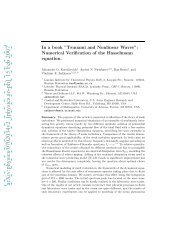OEO Office of Equal Opportunity - Department of Mathematics and ...
OEO Office of Equal Opportunity - Department of Mathematics and ...
OEO Office of Equal Opportunity - Department of Mathematics and ...
You also want an ePaper? Increase the reach of your titles
YUMPU automatically turns print PDFs into web optimized ePapers that Google loves.
GERMAN 203<br />
above 300. Three <strong>of</strong> these hours may consist <strong>of</strong> approved<br />
German Studies courses in other programs. No more than<br />
15 hours may be earned in courses <strong>of</strong>fered at the German<br />
Summer School.<br />
Second Major Option<br />
Students who present two majors (German <strong>and</strong> another field)<br />
are required to complete 24 hours <strong>of</strong> course work in German,<br />
to include the following: 301, 302, 307, <strong>and</strong> two <strong>of</strong> the following:<br />
305, 308, 370, 401, 405, 410, or 470 taken at the German<br />
Summer School may substitute for either 301 or 302, but not<br />
both. The remaining hours may be selected from German<br />
courses above 300. Three <strong>of</strong> these hours may consist <strong>of</strong><br />
approved German Studies courses in other programs. No<br />
more than 12 hours may be earned in courses <strong>of</strong>fered at the<br />
German Summer School.<br />
No more than 12 hours may be earned in courses <strong>of</strong>fered at<br />
the German Summer School.<br />
Minor Study Requirements<br />
Fifteen hours <strong>of</strong> course work above 300, including 301, 302.<br />
Lower Division German<br />
All beginning students should enroll in Basic German (101),<br />
which provides a foundation in reading, writing, listening <strong>and</strong><br />
speaking for all subsequent courses. All students who have<br />
never taken a German course at UNM must take a placement<br />
exam to determine the adequate course level. Heritage<br />
speakers are strongly advised not to enroll in lower-division<br />
language courses.<br />
203–204. Intermediate German Conversation. (1-3) ∆<br />
Optional course for students <strong>of</strong> 201–202 providing additional<br />
practice in speaking <strong>and</strong> listening. Students not concurrently<br />
enrolled in 201-202 may enroll only with the permission <strong>of</strong> the<br />
instructor. Offered on CR/NC basis only.<br />
275–276. Accelerated Beginning German. (6, 6)<br />
Intensive language course sequence that covers the material<br />
<strong>of</strong> 101–102, 201–202. After completing, 276 students are<br />
prepared to enroll in third-year courses. Students may not<br />
receive credit for both the accelerated sequence <strong>and</strong> the<br />
regular language course sequence (101 through 202).<br />
301–302. Advanced German. (3, 3)<br />
Contextual grammar review based on cultural materials from<br />
a variety <strong>of</strong> media <strong>and</strong> short literary texts.<br />
303. Advanced German Conversation. (1 to a maximum<br />
<strong>of</strong> 3) ∆<br />
Optional course for students <strong>of</strong> 301–302 providing additional<br />
practice in speaking <strong>and</strong> listening. Students not concurrently<br />
enrolled in 301-302 must obtain the permission <strong>of</strong> the instructor.<br />
Offered on CR/NC basis only.<br />
304. Theater Workshop. (3)<br />
Production <strong>of</strong> a dramatic work, emphasizing the performative<br />
<strong>and</strong> creative dimension <strong>of</strong> German language, culture,<br />
<strong>and</strong> history.<br />
305. Topics: Germany Today. [Germany Today.] (3)<br />
Study <strong>of</strong> present-day life <strong>and</strong> culture in Germany as represented<br />
in popular media, including TV <strong>and</strong> film. Aimed at<br />
students who wish to improve their language skills.<br />
307. Introduction to German Literature. (3)<br />
Study <strong>of</strong> literary texts <strong>of</strong> varying length from a variety <strong>of</strong><br />
genres <strong>and</strong> periods.<br />
ARTS AND<br />
SCIENCES<br />
Graduate Program<br />
Graduate Advisor<br />
Susanne Baackmann, Ortega Hall 349C, 277-3206<br />
theodor@unm.edu<br />
M.A. in German Studies<br />
The M.A. in German Studies provides an interdisciplinary<br />
foundation designed to prepare students for work in pertinent<br />
fields including secondary school teaching, translation work,<br />
<strong>and</strong> also for entrance to doctoral programs in German. A<br />
background in German equivalent to that <strong>of</strong> an undergraduate<br />
major is required for entering c<strong>and</strong>idates. M.A. c<strong>and</strong>idates<br />
may choose between two plans: under Plan I, they are<br />
required to complete 24 hours <strong>of</strong> course work plus 6 thesis<br />
hours; under Plan II, they are required to complete 32 hours<br />
<strong>of</strong> course work without thesis. The comprehensive exams<br />
involve a more extensive written component for Plan II. Core<br />
requirements include a theory course (3 credit hours) <strong>and</strong> a<br />
Pr<strong>of</strong>essional Development Colloquium (MLNG 501) (1 hour).<br />
Teaching assistants are also required to enroll in a Teaching<br />
Practicum (MLNG 500) during their first semester <strong>of</strong> teaching.<br />
Two semesters <strong>of</strong> another foreign language or its equivalent<br />
are required <strong>of</strong> all M.A. c<strong>and</strong>idates. Please contact the graduate<br />
advisor or the department for specific information.<br />
Undergraduate Program<br />
101–102. Basic German I–Basic German II. [Basic<br />
German.] (3, 3)<br />
Language course sequence for all beginning students, providing<br />
a foundation in reading, writing, listening <strong>and</strong> speaking<br />
skills for all subsequent courses. {Fall, Spring}<br />
201–202. Intermediate German I–Intermediate German<br />
II. [Intermediate German.] (3, 3)<br />
Continues development <strong>of</strong> skills in reading, writing, speaking<br />
<strong>and</strong> listening at the second-year level.<br />
308. Introduction to German Culture. (3)<br />
Introduction to cultural <strong>and</strong> intercultural aspects <strong>of</strong> life in<br />
German-speaking countries. Readings include historical as<br />
well as contemporary material.<br />
*336. Topics in German Literature <strong>and</strong> Culture in<br />
Translation. [German Literature <strong>and</strong> Culture in Translation.]<br />
(3 to a maximum <strong>of</strong> 12) [3] ∆<br />
(Also <strong>of</strong>fered as COMP, ENGL 336.) Study <strong>of</strong> individual<br />
authors, genres, <strong>and</strong>/or periods <strong>of</strong> German literature <strong>and</strong><br />
culture in translation.<br />
366. German Reading for Graduate Students. (3)<br />
Accelerated course for graduate reading requirements.<br />
Emphasizes readings in sciences <strong>and</strong> humanities. Will not<br />
satisfy A&S language requirement. Undergraduates must<br />
have permission <strong>of</strong> instructor.<br />
401. Contemporary German Cultures. (3)<br />
Study <strong>of</strong> contemporary social, political, <strong>and</strong> cultural trends<br />
in German-speaking countries based on a variety <strong>of</strong> current<br />
sources.<br />
405. Advanced German Composition. (3)<br />
Intensive practice <strong>of</strong> writing skills in a variety <strong>of</strong> genres.<br />
*446. Translation. (3)<br />
Study <strong>of</strong> theories <strong>and</strong> methods <strong>of</strong> translating, <strong>and</strong> practical<br />
work in translation from German into English <strong>and</strong> English<br />
into German.<br />
450. Special Topics in German Studies. (3, no limit) ∆<br />
Topics will deal with specific aspects <strong>of</strong> German literature <strong>and</strong><br />
culture <strong>and</strong> language. .<br />
480. Topics: Advanced Seminar in German Studies.<br />
[Advanced Seminar in German Studies.] (1-3, no limit) ∆<br />
Advanced study <strong>of</strong> periods <strong>and</strong> genres in German literature<br />
<strong>and</strong> thought from 1700 to present.<br />
UNM CATALOG 2006–2007 Symbols, page 611.



